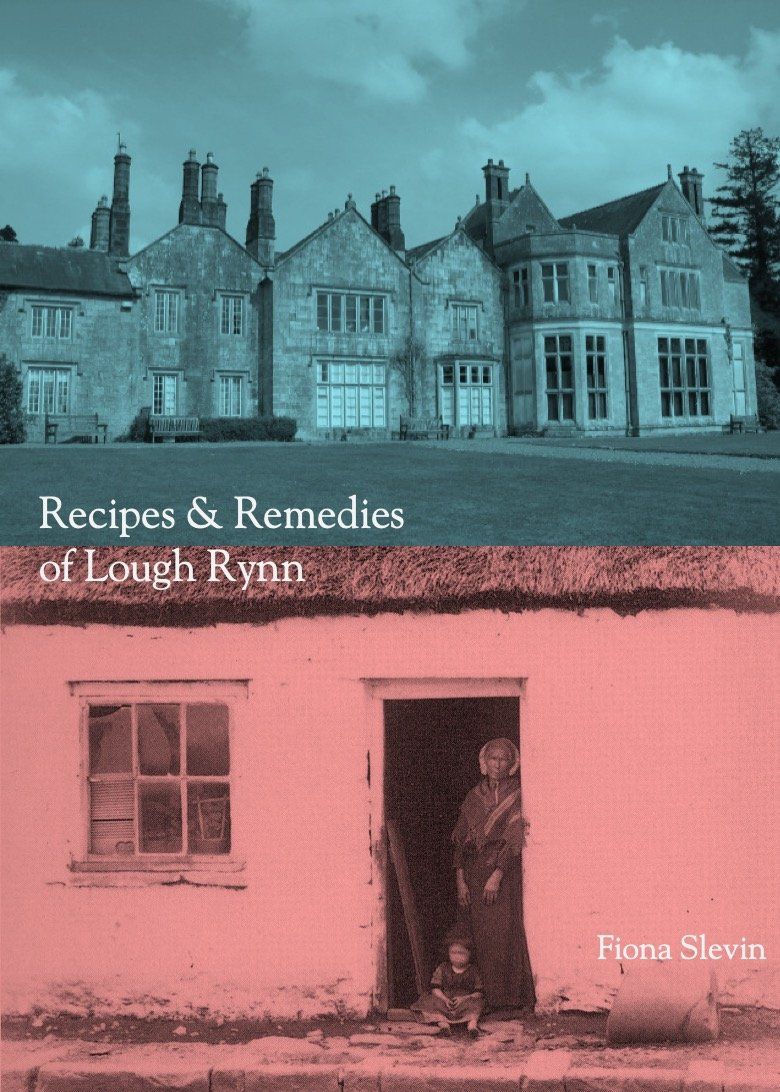'Recipes & Remedies of Lough Rynn' is currently available as a hardback or paperback: see opposite for details.
Recipes & Remedies of Lough Rynn
Now available as hardback and paperback!
Recipes and Remedies of Lough Rynn is based on original journals by the housekeeper at Lough Rynn, dating from the late 1800s.
The book is available (as of December 2022) as a print-on-demand paperback and hardback at Amazon.co.uk or Amazon.com.
I have a small number of copies to sell directly, if you prefer to
buy directly from me.
In researching the history of Lough Rynn, I came across original journals dating from the 19th century that were recorded as belonging to the housekeeper at Lough Rynn.
The books contained recipes and remedies that were recorded by housekeepers on the Lough Rynn estate, owned by Lord Leitrim.
These old recipe books don’t tell us much about what the vast majority of the people ate. But it is the very difference between the table of the lord and his tenants that is of interest and which raises lots of questions. Like how did they know about Indian Curry in Mohill in 1860? And where did they get their hands on parmesan cheese, and fresh lemons and nectarines? How did they preserve food without refrigerators and freezers? And then there’s the poignancy of comparing the ingredients for Poor Soup, or Rice for the Poor against the abundance and complication of Oyster Sausages or dressed French Beans.
Given what we know about Lord Leitrim, we can probably deduce how the workers in the stable yard felt about unloading deliveries of oranges and pineapples and veal and chicken and endives, when they could go a lifetime without tasting anything more exotic than a cabbage or an apple. And we can probably imagine how they felt about the tempting aromas emanating from the castle kitchens, especially after they had paid for these goods with their debilitating rent, and when they were going home to a meal of potatoes and milk, and if they were lucky, a rare ration of meat. We can’t really know for sure how they felt. We can’t even be sure that Lord Leitrim ever enjoyed many of the recipes. But we can make up our own stories. And maybe try out a few of the recipes. And imagine life at Lough Rynn 150 years ago.
The instructions for dishes and remedies were found in two separate journals, attributed to the housekeeper at Lough Rynn and held in the National Library of Ireland. The recipes were collected over the years, and the different hand-writing suggests they were added to over the years by different contributors - perhaps a succession of housekeepers, or maybe the originators of the recipes, who are occasionally credited by name. Some of the ingredients for the food dishes may surprise - like curry powder and parmesan cheese, or exotic fruits like lemons and pineapples, or spices like nutmeg and cloves. However, remember that the Earls of Leitrim, the Clements’ were well-traveled, cosmopolitan people. Robert and Sydney Clements had fought in Portugal and France during the Napoleonic and Prussian wars; Lord Leitrim spent a lot of time in Dublin and London - for social and political reasons. No doubt they picked up Victorian tastes and habits. And the Victorians were remarkably successful in growing all sorts of exotic fruits and spices in glasshouses, so not everything had to be imported from abroad. Even so, one must marvel at how they could manage to get fresh nectarines to Mohill in the early nineteenth century!
In editing the journals, I have kept the original wording and phraseology, but modernised the spelling and inserted punctuation where I felt it increased comprehensibility. I had to exclude some recipes where the hand-writing was just too difficult to decipher. I have also grouped them into what I hope will be a more accessible form: the originals list recipes in turn, as they were written. For anyone who cares to try any of the dishes or remedies, I can vouch for neither tastiness nor efficacy. Indeed, some of the ingredients may now be considered hazardous, and some should definitely be avoided during pregnancy. You try them at your own risk!
Read some Remedies here >>>, or buy the book here >>>
Contact form
We will get back to you as soon as possible.
Please try again later.

© Fiona Slevin | Last updated February 2024
This work is licensed under a Creative Commons Attribution-NonCommercial-ShareAlike 4.0 International License.
